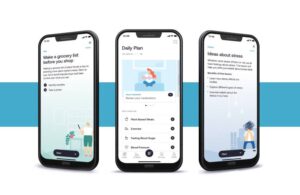
San Francisco-based Better Therapeutics develops the BT-001 prescription digital therapeutic (PDT). It potentially represents the first-in-class PDT using cognitive behavioral therapy (CBT) to treat type 2 diabetes.
In July, the company completed the pivotal trial for its BT-001 digital therapeutic for diabetes. It said at the time that the positive data supports its coming claim for FDA authorization. Last month, Better Therapeutics submitted a de novo classification request to the FDA for BT-001. Marketing initially would cover type 2 diabetes patients aged 18 years and older.
READ: 7 innovative digital health offerings to treat diabetes
Ninety-day results from the company’s pivotal trial were published in the American Diabetes Association (ADA)-produced, peer reviewed journal Diabetes Care.
The first 90 days of the pivotal trial observed adults with T2D receiving the current standard of care randomized to BT-001 or control. The trial marked the largest randomized, controlled study to date looking at digital CBT for improving glycemic control in T2D.
Patients using BT-001 experienced, on average, lowered A1c by 0.4% compared to control. Better Therapeutics observed a greater reduction among patients who completed more modules of the therapy. The published article determined that “delivery of a cognitive behavioral intervention via smartphone app can provide a scalable option for improving glycemic control.”
Encouraged by the potential of BT-001 from Better Therapeutics
Dr. Marc Bonaca, professor of medicine at the University of Colorado School of Medicine and Executive Director of CPC Clinical Research, presented the data on Oct. 1 as part of the Society for Vascular Medicine’s Annual Scientific Sessions.
“When it comes to cardiometabolic diseases like type 2 diabetes, available treatments have been focused on improving biomarkers alone, like glucose, rather than helping to address the underlying behaviors which lead to the onset and inevitable progression of disease,” said Bonaca. “While both are important, the foundation of treatment must include effective interventions for behavioral change. We are encouraged that digital solutions like BT-001 have the potential to be prescribed to help patients make sustainable changes that improve A1c and may also improve health outcomes, slow the progression of their disease and decrease the long-term cost of care.”
The 90-day results, combined with the 180-day results presented in July, supported Better Therapeutics’ FDA submission. Data demonstrates “encouraging improvement over the current standard of care,” the company says.
Users of BT-001 showed significant and durable A1c reductions at both 90 and 180 days. Exploratory data revealed cardiometabolic improvements and lower medication utilization compared to control.
“When we saw the complete results from this trial at both the 90- and 180-day endpoints, we were encouraged by the real and tangible potential of using our investigational, digitally-delivered CBT to help people with type 2 diabetes gain more control over their condition,” said Dr. Mark Berman, CMO of Better Therapeutics. “We are excited for this data to be featured in such a well-regarded and widely-cited publication as Diabetes Care.”

